

Computational Finance Certificate. The autumn 2014 program is closed.
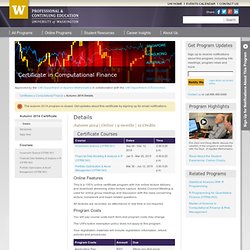
Get updates about this certificate by signing up for email notifications. Details Autumn 2014 | Online | 9 months | 12 Credits Certificate Courses Online Features This is a 100% online certificate program with live online lecture delivery and download streaming video lecture capture. All lectures are recorded, so attendance in real time is not required. Program Costs. (no sessions) Neural Networks for Machine Learning.
About the Course Neural networks use learning algorithms that are inspired by our understanding of how the brain learns, but they are evaluated by how well they work for practical applications such as speech recognition, object recognition, image retrieval and the ability to recommend products that a user will like.
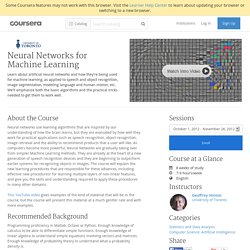
As computers become more powerful, Neural Networks are gradually taking over from simpler Machine Learning methods. They are already at the heart of a new generation of speech recognition devices and they are beginning to outperform earlier systems for recognizing objects in images. The course will explain the new learning procedures that are responsible for these advances, including effective new proceduresr for learning multiple layers of non-linear features, and give you the skills and understanding required to apply these procedures in many other domains.
Recommended Background Programming proficiency in Matlab, Octave or Python. (no sessions) High Performance Scientific Computing. About the Course Computation and simulation are increasingly important in all aspects of science and engineering.
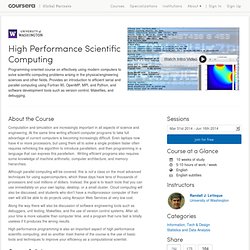
At the same time writing efficient computer programs to take full advantage of current computers is becoming increasingly difficult. Even laptops now have 4 or more processors, but using them all to solve a single problem faster often requires rethinking the algorithm to introduce parallelism, and then programming in a language that can express this parallelism. Writing efficient programs also requires some knowledge of machine arithmetic, computer architecture, and memory hierarchies. Although parallel computing will be covered, this is not a class on the most advanced techniques for using supercomputers, which these days have tens of thousands of processors and cost millions of dollars. Along the way there will also be discussion of software engineering tools such as debuggers, unit testing, Makefiles, and the use of version control systems.
(no sessions) Digital Signal Processing. About the Course The goal of the course is to develop a complete working set of digital signal processing notions from the ground up.
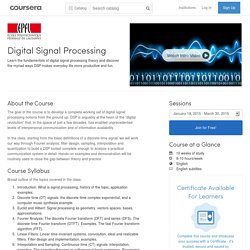
DSP is arguably at the heart of the “digital revolution” that, in the space of just a few decades, has enabled unprecedented levels of interpersonal communication and of information availability. In the class, starting from the basic definitions of a discrete-time signal, we will work our way through Fourier analysis, filter design, sampling, interpolation and quantization to build a DSP toolset complete enough to analyze a practical communication system in detail. Hands-on examples and demonstration will be routinely used to close the gap between theory and practice. Course Format The class will consist of videolectures, each approximately 45 minutes in length; videos will contain some interactive quiz questions.
(starting 12.09.2014) Computational Investing, Part I. (starting 29.09.2014) Mining Massive Datasets. About the Course We introduce the student to modern distributed file systems and MapReduce, including what distinguishes good MapReduce algorithms from good algorithms in general.
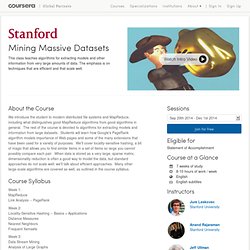
The rest of the course is devoted to algorithms for extracting models and information from large datasets. Students will learn how Google's PageRank algorithm models importance of Web pages and some of the many extensions that have been used for a variety of purposes. We'll cover locality-sensitive hashing, a bit of magic that allows you to find similar items in a set of items so large you cannot possibly compare each pair.
When data is stored as a very large, sparse matrix, dimensionality reduction is often a good way to model the data, but standard approaches do not scale well; we'll talk about efficient approaches. Course Syllabus Week 1: MapReduce Link Analysis -- PageRank Week 2: Locality-Sensitive Hashing -- Basics + Applications Distance Measures Nearest Neighbors Frequent Itemsets Recommended Background. (26.08.2014-04.11.2014) Introduction to Computational Finance and Financial Econometrics. Learn mathematical, programming and statistical tools used in the real world analysis and modeling of financial data.

Apply these tools to model asset returns, measure risk, and construct optimized portfolios using the open source R programming language and Microsoft Excel. Learn how to build probability models for asset returns, to apply statistical techniques to evaluate if asset returns are normally distributed, to use Monte Carlo simulation and bootstrapping techniques to evaluate statistical models, and to use optimization methods to construct efficient portfolios. You'll do the R assignments for this course on DataCamp.com, an online interactive learning platform that offers free R tutorials through learning-by-doing. The platform provides you with hints and instant feedback on how to perform even better.
(starting 01.2015) Heterogeneous Parallel Programming. About the Course All computing systems, from mobile to supercomputers, are becoming heterogeneous, massively parallel computers for higher power efficiency and computation throughput.
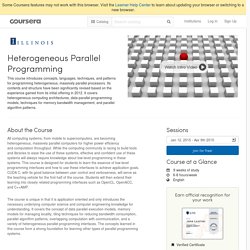
While the computing community is racing to build tools and libraries to ease the use of these systems, effective and confident use of these systems will always require knowledge about low-level programming in these systems. (starting 09.12.2014) Computational Methods for Data Analysis. (self-paced) Intro to Hadoop and MapReduce.